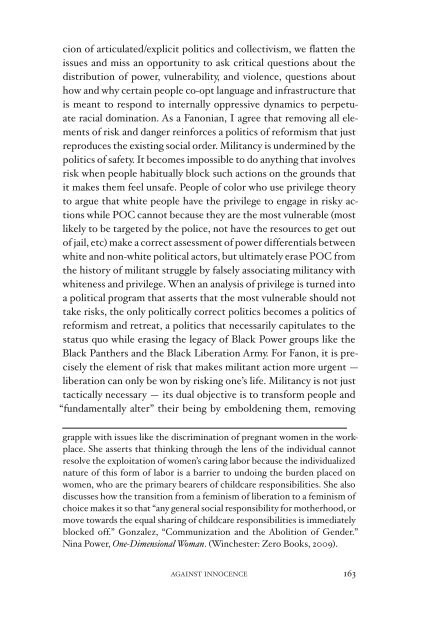Lies: A Journal of Materialist Feminism - Libcom
Lies: A Journal of Materialist Feminism - Libcom
Lies: A Journal of Materialist Feminism - Libcom
Create successful ePaper yourself
Turn your PDF publications into a flip-book with our unique Google optimized e-Paper software.
cion <strong>of</strong> articulated/explicit politics and collectivism, we flatten the<br />
issues and miss an opportunity to ask critical questions about the<br />
distribution <strong>of</strong> power, vulnerability, and violence, questions about<br />
how and why certain people co-opt language and infrastructure that<br />
is meant to respond to internally oppressive dynamics to perpetuate<br />
racial domination. As a Fanonian, I agree that removing all elements<br />
<strong>of</strong> risk and danger reinforces a politics <strong>of</strong> reformism that just<br />
reproduces the existing social order. Militancy is undermined by the<br />
politics <strong>of</strong> safety. It becomes impossible to do anything that involves<br />
risk when people habitually block such actions on the grounds that<br />
it makes them feel unsafe. People <strong>of</strong> color who use privilege theory<br />
to argue that white people have the privilege to engage in risky actions<br />
while POC cannot because they are the most vulnerable (most<br />
likely to be targeted by the police, not have the resources to get out<br />
<strong>of</strong> jail, etc) make a correct assessment <strong>of</strong> power differentials between<br />
white and non-white political actors, but ultimately erase POC from<br />
the history <strong>of</strong> militant struggle by falsely associating militancy with<br />
whiteness and privilege. When an analysis <strong>of</strong> privilege is turned into<br />
a political program that asserts that the most vulnerable should not<br />
take risks, the only politically correct politics becomes a politics <strong>of</strong><br />
reformism and retreat, a politics that necessarily capitulates to the<br />
status quo while erasing the legacy <strong>of</strong> Black Power groups like the<br />
Black Panthers and the Black Liberation Army. For Fanon, it is precisely<br />
the element <strong>of</strong> risk that makes militant action more urgent —<br />
liberation can only be won by risking one’s life. Militancy is not just<br />
tactically necessary — its dual objective is to transform people and<br />
“fundamentally alter” their being by emboldening them, removing<br />
grapple with issues like the discrimination <strong>of</strong> pregnant women in the workplace.<br />
She asserts that thinking through the lens <strong>of</strong> the individual cannot<br />
resolve the exploitation <strong>of</strong> women’s caring labor because the individualized<br />
nature <strong>of</strong> this form <strong>of</strong> labor is a barrier to undoing the burden placed on<br />
women, who are the primary bearers <strong>of</strong> childcare responsibilities. She also<br />
discusses how the transition from a feminism <strong>of</strong> liberation to a feminism <strong>of</strong><br />
choice makes it so that “any general social responsibility for motherhood, or<br />
move towards the equal sharing <strong>of</strong> childcare responsibilities is immediately<br />
blocked <strong>of</strong>f.” Gonzalez, “Communization and the Abolition <strong>of</strong> Gender.”<br />
Nina Power, One-Dimensional Woman. (Winchester: Zero Books, 2009).<br />
AGAINST INNOCENCE 163

















